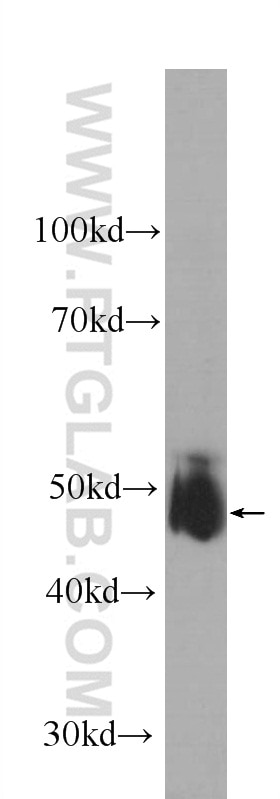Tested Applications
| Positive WB detected in | human blood tissue |
Recommended dilution
| Application | Dilution |
|---|---|
| Western Blot (WB) | WB : 1:500-1:2000 |
| It is recommended that this reagent should be titrated in each testing system to obtain optimal results. | |
| Sample-dependent, Check data in validation data gallery. | |
Published Applications
| WB | See 5 publications below |
| IF | See 2 publications below |
Product Information
60276-1-Ig targets KCNN4 in WB, IF, ELISA applications and shows reactivity with human, mouse, rat samples.
| Tested Reactivity | human, mouse, rat |
| Cited Reactivity | human, mouse, rat |
| Host / Isotype | Mouse / IgG2a |
| Class | Monoclonal |
| Type | Antibody |
| Immunogen |
CatNo: Ag19774 Product name: Recombinant human KCNN4 protein Source: e coli.-derived, PGEX-4T Tag: GST Domain: 128-427 aa of BC015337 Sequence: VQDLGAPLTSPQPWPGFLGQGEALLSLAMLLRLYLVPRAVLLRSGVLLNASYRSIGALNQVRFRHWFVAKLYMNTHPGRLLLGLTLGLWLTTAWVLSVAERQAVNATGHLSDTLWLIPITFLTIGYGDVVPGTMWGKIVCLCTGVMGVCCTALLVAVVARKLEFNKAEKHVHNFMMDIQYTKEMKESAARVLQEAWMFYKHTRRKESHAARRHQRKLLAAINAFRQVRLKHRKLREQVNSMVDISKMHMILYDLQQNLSSSHRALEKQIDTLAGKLDALTELLSTALGPRQLPEPSQQSK Predict reactive species |
| Full Name | potassium intermediate/small conductance calcium-activated channel, subfamily N, member 4 |
| Calculated Molecular Weight | 427 aa, 48 kDa |
| Observed Molecular Weight | 48 kDa |
| GenBank Accession Number | BC015337 |
| Gene Symbol | KCNN4 |
| Gene ID (NCBI) | 3783 |
| RRID | AB_2881395 |
| Conjugate | Unconjugated |
| Form | Liquid |
| Purification Method | Protein A purification |
| UNIPROT ID | O15554 |
| Storage Buffer | PBS with 0.02% sodium azide and 50% glycerol, pH 7.3. |
| Storage Conditions | Store at -20°C. Stable for one year after shipment. Aliquoting is unnecessary for -20oC storage. 20ul sizes contain 0.1% BSA. |
Background Information
The intermediate conductance calcium-activated potassium channel KCNN4, also known as KCa3.1, IK1, or SK4, is a member of the potassium channel KCNN family. KCNN4 is expressed in T cells, mast cells, macrophages, erythrocytes, vascular smooth muscle cells, airway smooth muscle cells, intestinal and airway epithelial cells (PMID: 19681865; 21493782). Functionally, KCNN4 plays a key role in calcium-dependent cell functions, such as proliferation, activation, and migration, in a broad range of cell types (PMID: 21493782).
Protocols
| Product Specific Protocols | |
|---|---|
| WB protocol for KCNN4 antibody 60276-1-Ig | Download protocol |
| Standard Protocols | |
|---|---|
| Click here to view our Standard Protocols |
Publications
| Species | Application | Title |
|---|---|---|
J Inflamm Res KCa3.1 Inhibition of Macrophages Suppresses Inflammatory Response Leading to Endothelial Damage in a Cell Model of Kawasaki Disease. | ||
Mol Med Rep M2 macrophage‑derived exosomes alleviate KCa3.1 channel expression in rapidly paced HL‑1 myocytes via the NF‑κB (p65)/STAT3 signaling pathway | ||
Cell Death Dis IKCa channels control breast cancer metabolism including AMPK-driven autophagy | ||
Nat Commun Phospholipid scrambling induced by an ion channel/metabolite transporter complex | ||
J Hematol Oncol The LINC00623/NAT10 signaling axis promotes pancreatic cancer progression by remodeling ac4C modification of mRNA |




